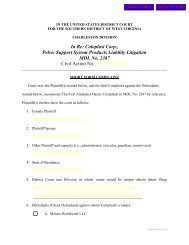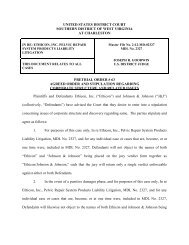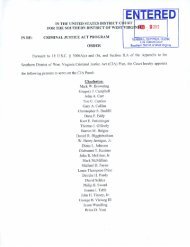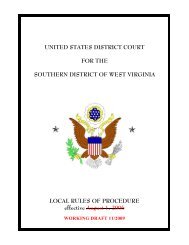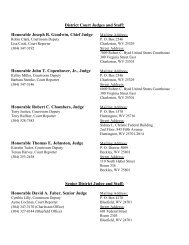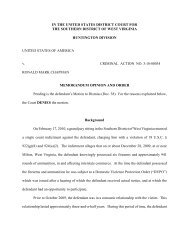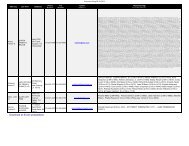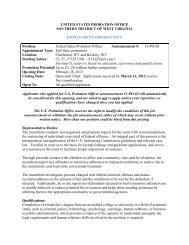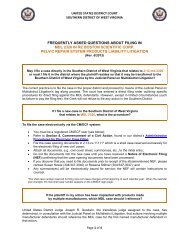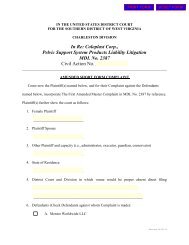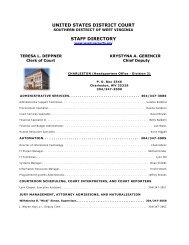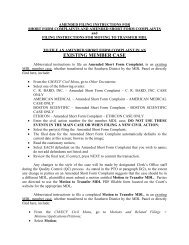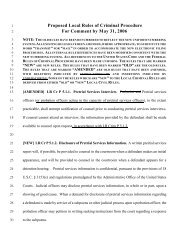P:\Active Cases\Civil\JKL\Leonard v Mylan 1160 (1) - Southern ...
P:\Active Cases\Civil\JKL\Leonard v Mylan 1160 (1) - Southern ...
P:\Active Cases\Civil\JKL\Leonard v Mylan 1160 (1) - Southern ...
Create successful ePaper yourself
Turn your PDF publications into a flip-book with our unique Google optimized e-Paper software.
DANIEL LEONARD, et al.,<br />
IN THE UNITED STATES DISTRICT COURT<br />
FOR THE SOUTHERN DISTRICT OF WEST VIRGINIA<br />
CHARLESTON DIVISION<br />
Plaintiffs,<br />
v. CIVIL ACTION NO. 2:09-cv-0<strong>1160</strong><br />
MYLAN, INC., et al.,<br />
Defendants.<br />
MEMORANDUM OPINION AND ORDER<br />
Pending before the court is the defendants’ Motion to Transfer Pursuant to 28 U.S.C. § 1404<br />
[Docket 11]. The motion is GRANTED.<br />
I. Background<br />
This is a products liability case. According to the Complaint, Salli Rae Leonard, a resident<br />
of Holland, Michigan, was prescribed 75 mcg fentanyl transdermal system patches (the “patch”).<br />
The patch administers the pain drug fentanyl to the user’s bloodstream through the skin. Ms.<br />
Leonard filled her prescription at a local pharmacy. She used the patch and, in September 2007,<br />
died from “acute fentanyl overdose.” (Compl. 11.) These events occurred in or around Holland,<br />
Michigan. 1<br />
Daniel Leonard, Ms. Leonard’s husband and the administrator of her estate, is suing the<br />
manufacturers of the patch on behalf of himself and the estate. He filed the Complaint in the Circuit<br />
Court of Boone County, West Virginia. The Complaint asserts several claims for strict products<br />
liability, breach of express warranty, and violation of West Virginia consumer-protection law. The<br />
1 Holland is in the federal Western District of Michigan.
defendants — corporate residents of Pennsylvania and West Virginia — removed the case to federal<br />
court on October 22, 2009. 2<br />
The defendants filed their transfer motion on May 20, 2010. This case, they argue, should<br />
be litigated in Michigan, because the plaintiffs are Michigan residents and the plaintiffs’ claims<br />
arose there. The plaintiffs disagree. They counter that the case is properly in West Virginia,<br />
because two of the defendants, <strong>Mylan</strong> Pharmaceuticals, Inc. and <strong>Mylan</strong> Technologies, Inc., are<br />
incorporated here.<br />
II. Discussion<br />
The defendants seek transfer pursuant to 28 U.S.C. § 1404(a). That statute authorizes a<br />
district court to transfer a case to another judicial district “[f]or the convenience of parties and<br />
witnesses, in the interest of justice.” 28 U.S.C. § 1404(a). Section 1404(a) is generally reserved for<br />
cases that are filed in the proper district, but in which convenience dictates transfer to another<br />
district. Section 1406(a) of Title 28, on the other hand, provides that “[t]he district court in which<br />
is filed a case laying venue in the wrong division or district shall dismiss, or if it be in the interest<br />
of justice, transfer such case to any district or division in which it could have been brought.” That<br />
statute usually applies when a case is simply filed in the wrong district and needs to be transferred.<br />
Each of these statutes carries its own consequences. See Lafferty v. St. Riel, 495 F.3d 72, 76-<br />
77 (2007) (outlining differences between §§ 1404(a) and 1406(a)). Under § 1404(a), the transferee<br />
2 Home-state defendants are generally precluded from removing a case to federal court. But<br />
this rule only applies when the home-state defendant has been “properly joined and served.” 28<br />
U.S.C. § 1441(b). This case was removed before any of the West Virginia corporate defendants<br />
were served. (Notice of Removal 5.) Even if this matter was not removable, the plaintiffs waived<br />
this procedural defect by not objecting within thirty days of removal. 28 U.S.C. § 1447(c);<br />
Ellenburg v. Spartan Motors Chassis, Inc., 519 F.3d 192, 198 (4th Cir. 2008).<br />
-2-
court applies the choice-of-law rules of the transferor court. Van Dusen v. Barrack, 376 U.S. 612,<br />
632-37 (1964) (“A change of venue under s. 1404(a) generally should be . . . but a change in<br />
courtrooms.”). This discourages forum-shopping defendants from seeking alternative fora with<br />
more favorable substantive law. The result is different, however, in a § 1406(a) transfer. Under §<br />
1406(a), the transferee court applies its own choice-of-law principles. Piper Aircraft Co. v. Reyno,<br />
454 U.S. 235, 243 n.8 (1981); Adam v. J.B. Hunt Transport, Inc., 130 F.3d 219, 230 (6th Cir. 1997)<br />
(“Because the case was transferred pursuant to 28 U.S.C. § 1406(a) . . . the transferee court was<br />
required to apply the choice-of-law rules that would have been applicable had the action been<br />
commenced in that court.”). When a case has been transferred under § 1406(a), forum-shopping is<br />
not a concern, because the lawsuit was initially filed in the wrong district. Transfer simply remedies<br />
the venue defect.<br />
The differences between § 1404(a) and § 1406(a) are not limited to choice-of-law<br />
ramifications. As explained above, a § 1406(a) transfer is based on improper venue. Rule 12(b)(3)<br />
of the Federal Rules of Civil Procedure, however, provides that objection to improper venue is an<br />
affirmative defense that is waived if it is not made before or with a responsive pleading. So failure<br />
to timely seek transfer under § 1406(a) constitutes waiver. But unlike a § 1406(a) motion, a § 1404<br />
transfer request carries no time restraints. Jones v. Walgreen Co., 463 F. Supp. 2d 267, 271 (D.<br />
Conn. 2006). Indeed, because it is based on convenience, § 1404(a) invites case development to<br />
locate evidence and identify witnesses.<br />
Determining proper venue is generally guided by 28 U.S.C. § 1391. That statute offers three<br />
options in diversity cases. See 28 U.S.C. § 1391(b). The first option is based on the residence of<br />
the defendants. Venue is proper in “a judicial district where any defendant resides, if all defendants<br />
-3-
eside in the same State.” Id. § 1391(b)(1). That provision is inapplicable, however, when the<br />
defendants are residents of different states. 3 The second option focuses on where the events<br />
underlying the plaintiff’s claims occurred. Venue lies in “a judicial district in which a substantial<br />
part of the events or omissions giving rise to the claim occurred, or a substantial part of property that<br />
is the subject of the action is situated.” Id. § 1391(b)(2). The third option is a fail-safe that operates<br />
if neither § 1391(a) or (b) apply. Venue is appropriate in “a judicial district in which any defendant<br />
is subject to personal jurisdiction at the time the action is commenced, if there is no district in which<br />
the action may otherwise be brought.” Id. § 1391(b)(3). My analysis will center on the first two<br />
options.<br />
Here, the defendants’ § 1404(a) transfer request is an ill fit to these procedural facts. The<br />
<strong>Southern</strong> District of West Virginia is not the proper venue for this case. Section 1391(b)(1) does<br />
not apply, because the defendants are corporate residents of different states. Nor is venue proper<br />
here under § 1391(b)(2). The events or omissions giving rise to the plaintiffs’ claims all occurred<br />
in the Western District of Michigan, not the <strong>Southern</strong> District of West Virginia. Ms. Leonard was<br />
prescribed the patch in Michigan, she filled her prescription there, she overdosed there, and she died<br />
there. Conversely, no material facts relating to the plaintiffs’ injuries occurred in the <strong>Southern</strong><br />
District of West Virginia. Therefore, the Western District of Michigan, rather than the <strong>Southern</strong><br />
District of West Virginia, is the appropriate venue for this case. As such, transfer under § 1406(a),<br />
rather than § 1404(a), is the more appropriate remedy. But the defendants waived their ability to<br />
seek § 1406(a) transfer. They filed their Answer on February 16, 2010, but did not file the Motion<br />
3 “[A] defendant that is a corporation shall be deemed to reside in any judicial district in<br />
which it is subject to personal jurisdiction at the time the action is commenced.” 28 U.S.C. §<br />
1391(c).<br />
-4-
to Transfer until May 20, 2010. Without § 1406(a) as an option, the defendants are left with §<br />
1404(a) as their only recourse for transfer.<br />
In deciding whether to transfer a case under § 1404(a), a court must first determine whether<br />
the action “might have been brought” in the transferee district. 28 U.S.C. § 1404(a). If so, then the<br />
court should consider several private- and public-interest factors: ease of access to evidence; the<br />
convenience of the parties and witnesses; the cost of obtaining the attendance of witnesses; the<br />
availability of compulsory process; the possibility of a view; the interest in having local<br />
controversies decided at home; and the overriding interests of justice. Vass v. Volvo Trucks, N. Am.,<br />
Inc., 304 F. Supp. 2d 851, 857 (S.D. W. Va. 2004). The party seeking transfer carries the burden<br />
of showing that the current venue is inconvenient. N.Y. Marine & Gen. Ins. Co. v. Lafarge N. Am.,<br />
Inc., 599 F.3d 102, 113-14 (2d Cir. 2010). The plaintiff’s choice of forum is accorded great weight.<br />
Piper Aircraft Co. v. Reyno, 454 U.S. 235, 255 (1981).<br />
Considering these factors, this case should be tried in the Western District of Michigan. First,<br />
this case could have originally been filed there. As explained above, the events or omissions giving<br />
rise to the plaintiffs’ claims occurred there. Venue is thus proper in that district under § 1391(b)(2).<br />
Second, the private- and public-interest factors favor transfer. Regarding the private-interest factors,<br />
all relevant facts in this case occurred in Michigan. The majority of witnesses — witnesses such as<br />
law enforcement officers, medical examiners and toxicologists, as well as Ms. Leonard’s medical<br />
providers — are in Michigan. Indeed, all nonparty witnesses identified by the plaintiffs in their Rule<br />
26(a) report is in Michigan. Likewise, evidence regarding Ms. Leonard’s medical history and the<br />
circumstances surrounding her death will be found in Michigan. Furthermore, evidence related to<br />
the defendants’ design and manufacture of the patch in possession of the defendants will be subject<br />
-5-
to the Michigan federal court’s subpoena power. As for the public-interest factors, Michigan has<br />
a strong interest in having this case litigated locally. Michigan’s interests include having one of its<br />
citizen’s rights vindicated, as well as protecting its other citizens from potentially harmful<br />
pharmaceutical drugs. Conversely, West Virginia’s interests are few. Other than the incorporation<br />
of two of the defendants in West Virginia, there are no West Virginia interests in this case.<br />
Justice is best served by having this case proceed in the Western District of Michigan. The<br />
plaintiffs’ choice of forum is substantially outweighed by Michigan’s position as the epicenter of<br />
this litigation. Transfer is necessary to “prevent the waste of time, energy and money and to protect<br />
litigants, witnesses and the public against unnecessary inconvenience and expense.” Van Dusen,<br />
376 U.S. at 616.<br />
III. Conclusion<br />
For the forgoing reasons, the Motion to Transfer [Docket 11] is GRANTED. This case shall<br />
be TRANSFERRED to the United States District Court for the Western District of Michigan. The<br />
court DIRECTS the Clerk to send a copy of this Order to counsel of record and any unrepresented<br />
party. The court further DIRECTS the Clerk to post a copy of this published opinion on the court's<br />
website, www.wvsd.uscourts.gov.<br />
ENTER: June 21, 2010<br />
-6-



